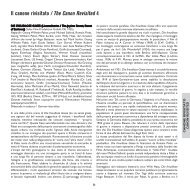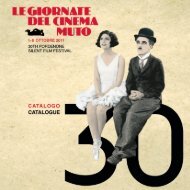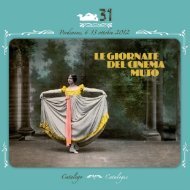Le Giornate del Cinema Muto 2006 Sommario / Contents
Le Giornate del Cinema Muto 2006 Sommario / Contents
Le Giornate del Cinema Muto 2006 Sommario / Contents
You also want an ePaper? Increase the reach of your titles
YUMPU automatically turns print PDFs into web optimized ePapers that Google loves.
Prog. 1 Un film titanico / A Titanic Film<br />
ATLANTIS (Nordisk Films Kompagni, DK 1913)<br />
Regia/dir: August Blom; scen: Karl-Ludwig Schröder, Axel Garde, dal<br />
romanzo di/based on the novel by Gerhart Hauptmann (1912); f./ph:<br />
Johan Ankerstjerne; cast: Olaf Fønns (Dr. Friedrich von Kammacher),<br />
Ida Orloff (Ingigerd Hahlstrom), Ebba Thomsen (Eva Burns), Frederik<br />
Jacobsen (Dr. Rasmussen), Carl Lauritzen (Dr. Peter Schmidt), Charles<br />
Unthan (Arthur Stoss), Torben Meyer (Willy Snyders); première:<br />
26.12.1913; 35mm, 2614 m., 116’ (20 fps), Danish Film Institute.<br />
Restauro <strong>del</strong>/Restored in 1995.<br />
Didascalie in danese e inglese / Danish & English intertitles.<br />
Il biologo Friedrich von Kammacher è colpito doppiamente dalla<br />
sorte: sua moglie si ammala e impazzisce, e la sua tesi di dottorato<br />
viene respinta. Si reca allora a Berlino, dov’è stregato da Ingigerd, una<br />
giovane danzatrice. Impulsivamente la segue quando lei si imbarca all<br />
volta <strong>del</strong>l’America. Il transatlantico su cui viaggiano affonda e i due<br />
sono tra i pochi superstiti. Una volta a New York, la volubilità di lei lo<br />
infastidisce sempre di più, senza per questo accorgersi<br />
<strong>del</strong>l’ammirazione che nutre per lui la scultrice Eva. Fugge poi in una<br />
remota capanna in montagna, dove ha una crisi nervosa. Eva lo aiuterà<br />
a ritrovare la voglia di vivere e di amare, e i due si sposeranno.<br />
Atlantis fu la maggiore e più ambiziosa produzione <strong>del</strong>la Nordisk Film.<br />
Definito dallo storico Erik Ulrichsen nel 1958 il “primo film<br />
moderno”, fu il più importante Autorenfilm <strong>del</strong>la casa, basato com’era<br />
su un romanzo di Gerhart Hauptmann (1862-1946), vincitore <strong>del</strong><br />
premio Nobel per la letteratura nel 1912 e considerato all’epoca il<br />
maggior scrittore tedesco vivente. Il romanzo Atlantis era<br />
semiautobiografico e Hauptmann insisté affinché due importanti<br />
ruoli fossero interpretati dalle persone vere che avevano ispirato i<br />
personaggi: nel 1906-07, lo scrittore era stato stregato da una Ida<br />
Orloff adolescente, ma il suo fascino non resta davvero impresso nel<br />
film; e Unthan, l’uomo senza braccia, interpreta sostanzialmente se<br />
stesso. Hauptmann aveva descritto l’affondamento di un<br />
transatlantico in una parte <strong>del</strong> romanzo, che inizialmente era stato<br />
pubblicato a puntate, proprio poche settimane prima <strong>del</strong> naufragio<br />
<strong>del</strong> Titanic. La scena <strong>del</strong> disastro, che divenne il principale motivo di<br />
richiamo <strong>del</strong> film – accusato per questo di vergognoso sfruttamento<br />
di una sciagura –, è ancora notevole per realismo e grandiosità.<br />
Peraltro, Atlantis è realmente un ritratto psicologico che mostra un<br />
uomo <strong>del</strong>l’epoca moderna, entrato in una profonda crisi mentale.<br />
Per tale ragione, manca di una forte ossatura narrativa, ma funziona<br />
per la recitazione trattenuta di Fønss, la magnifica fotografia e la<br />
raffinata regia di Blom. – CASPER TYBJERG<br />
The biologist Friedrich von Kammacher is struck by a double misfortune: his<br />
wife is taken ill and loses her mind, and his doctoral dissertation is rejected.<br />
He travels to Berlin, where he is bewitched by Ingigerd, a young dancer.<br />
Impulsively he follows her when she leaves for America. The transatlantic<br />
55<br />
steamer is wrecked, and the two are among the few survivors. In New York,<br />
her capriciousness gets increasingly on his nerves, but he does not notice<br />
that the sculptress Eva admires him. He flees to a remote mountain cabin,<br />
where he suffers a nervous breakdown. Eva helps him rediscover the will to<br />
live and love, and he marries her.<br />
Atlantis was Nordisk Film’s biggest and most ambitious production. Called<br />
the “first modern film” by historian Erik Ulrichsen in 1958, it was the<br />
company’s most important Autorenfilm, based as it was on a novel by<br />
Gerhart Hauptmann (1862-1946), winner of the 1912 Nobel Prize for<br />
Literature, and then generally regarded as the greatest living German writer.<br />
The novel Atlantis was semi-autobiographical, and Hauptmann insisted<br />
that two important roles should be played by the actual people who inspired<br />
the characters: Hauptmann had been bewitched by Ida Orloff in 1906-07<br />
when she was in her mid-teens, but her charms do not really register in the<br />
film; and Unthan, the armless man, basically plays himself. Hauptmann had<br />
described the sinking of a transatlantic liner in a section of the novel, which<br />
initially was serialized just weeks before the wreck of the Titanic. The<br />
shipwreck scene became the big selling-point of the film, prompting<br />
accusations of shameless exploitation of the Titanic disaster; it still<br />
impresses with its realism and sheer scale. However, Atlantis is really a<br />
psychological portrait, showing a man of the modern age who lives through<br />
a profound mental crisis. For that reason, it lacks a strong narrative<br />
backbone, but it succeeds through Fønss’ restrained performance, the<br />
beautiful cinematography, and Blom’s refined direction. – CASPER TYBJERG<br />
Prog. 2 <strong>Le</strong> schiave bianche / White Slavery<br />
DEN HVIDE SLAVINDE [La schiava bianca] (The White Slave)<br />
(Nordisk Films Kompagni, DK 1907)<br />
Regia/dir: Viggo Larsen; scen: Arnold Richard Nielsen; f./ph: Axel<br />
Sørensen; scg./des: Robert Krause; cast: Gerda Jensen (la ragazza/the<br />
young woman),Viggo Larsen (il suo fidanzato/her fiancé), Gustav Lund<br />
(suo padre/her father); prod. 1906; première: 12.1.1907; 35mm, 150 m.,<br />
8’ (16 fps), Danish Film Institute. Copia <strong>del</strong>/ Print from 1957.<br />
Didascalie in danese / Danish intertitles.<br />
<strong>Le</strong>tto un annuncio sul giornale, una ragazza lo mostra entusiasta ad un<br />
giovanotto che le sta dietro. <strong>Le</strong>i parte treno e lui le consegna un<br />
piccione viaggiatore. Alla fine <strong>del</strong> viaggio, la ragazza incontra una<br />
signora che la porta a casa sua; qui le viene fatto indossare un abito<br />
da sera e poi viene condotta in una sala piena di crapuloni. <strong>Le</strong>i respinge<br />
le loro avances e viene rinchiusa nella sua stanza. Comprendendo di<br />
esser finita in un bor<strong>del</strong>lo, libera il piccione con un messaggio. Il<br />
giovanotto lo riceve ed arriva al bor<strong>del</strong>lo con la polizia; porta la<br />
ragazza via con sé, ma, dopo che la polizia se n’è andata, le orge<br />
continuano.<br />
Primo film Nordisk sulle schiave bianche, questa breve pellicola ad un<br />
rullo ha già la struttura narrativa di base dei film che seguiranno: una<br />
ragazza povera-ma-onesta finisce nella rete <strong>del</strong>la tratta <strong>del</strong>le bianche;<br />
NORDISK

















